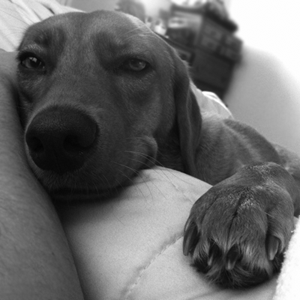Dogs, Frat Boys, and Leadership
For anyone who knows me personally, it should come as no surprise that I spent a portion of my holiday weekend tucked in to the December/January ’12 issue of Garden and Gun magazine. This issue’s cover model is a very handsome black Labrador retriever named Deke, a hunting dog trained at the famous Wildrose Kennels in Mississippi.
Luna
Our house is crawling with dogs—we currently have seven—so anything about training dogs, dog psychology, or getting your pack to do anything you desperately hope it would do appeals to me. The owner of Wildrose, Mike Stewart, who is legendary for turning out doggies who absolutely love to listen and work for their masters, offered some tips at the end of story.
As it turns out, being a great dog leader is just like being a people leader! ( And you thought this post was just an excuse to make you look at photos of my mutts.)
“The way I see it, most dogs are just out for a good time. I equate them with frat boys at Ole Miss. Yeah, it’s fun to stand around with a plastic cup of beer and a cigarette. But if you show them there’s value in work beyond that, if you stop that behavior and show them there’s more that’s possible in their life? Motivate them to see other, bigger rewards? Well, both the frat boy and the dog might very well adopt the new behavior. Then you reinforce it, and that new behavior is still fun. It’s just a different kind of fun.” -Mike Stewart, Wildrose Kennels
The Pud
The special thing about effectively leading (or managing or teaching or parenting) is the ability to connect the work or discipline needed for a new skill to the excitement and personal satisfaction that that new skill can bring. In fact, not only does effectively teaching a new skill foster enthusiasm about that particular skill, but it also creates enthusiasm around the entire experience of learning and being productive.
Getting this "different kind of fun" to register is what keeps [some of] my dogs heeling off-leash and what can ultimately keep a waffling high school student from dropping out. It propels an Australian Shepherd through a Fly Ball course and keeps a piano student seated at the bench for an extra hour of practice. It keeps a seeing-eye dog faithfully leading its master and a CEO keeping her team on task.
...and it drives people coming out of a long holiday weekend back to their desks.
Curiosity begets curiosity. Discipline with reward begets more discipline. Achievement begets achievement.
Astro
When we see no reason to do new work, when we don’t value what it is we’re creating, and when the task at hand seems disconnected from a more worthwhile world around us, it makes all the sense in the world that we’d do the same thing a dog naturally does: lay around and nap.
How do you make the connection to a "different kind of fun" for those you lead? For yourself?
Stevie







